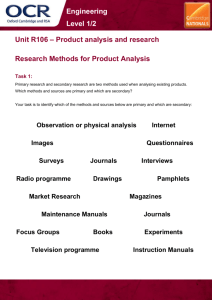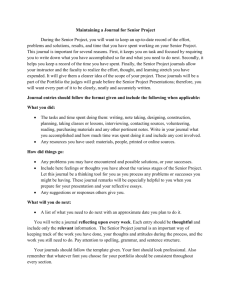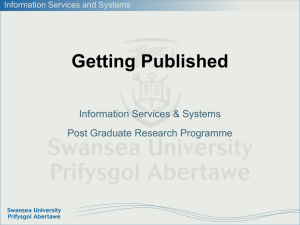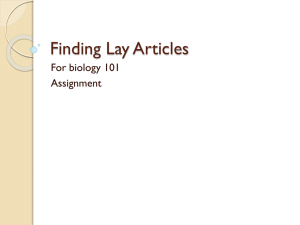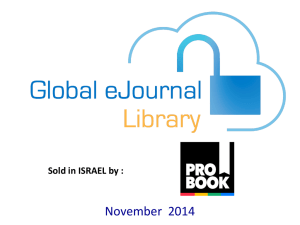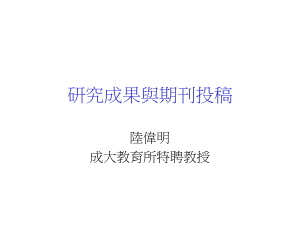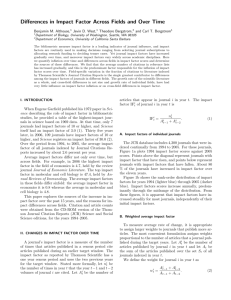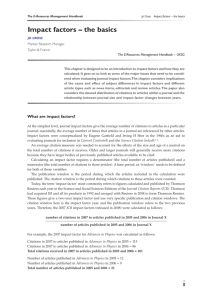Impact Factor - Academia Publishing
advertisement
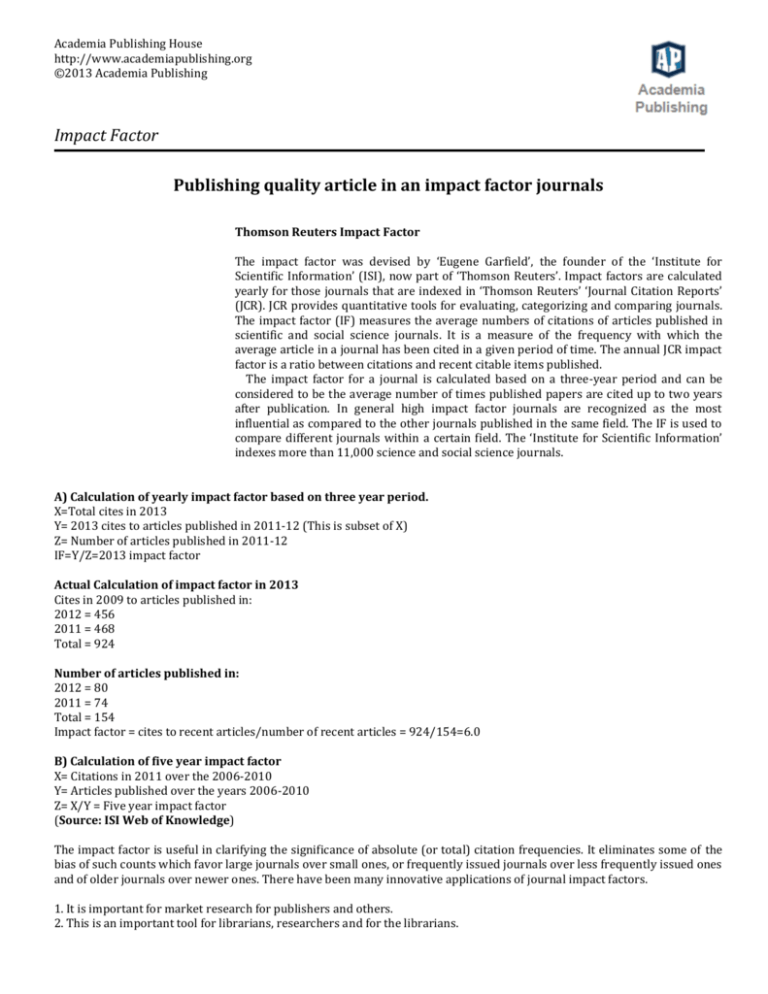
Academia Publishing House http://www.academiapublishing.org ©2013 Academia Publishing Impact Factor Publishing quality article in an impact factor journals Thomson Reuters Impact Factor The impact factor was devised by ‘Eugene Garfield’, the founder of the ‘Institute for Scientific Information’ (ISI), now part of ‘Thomson Reuters’. Impact factors are calculated yearly for those journals that are indexed in ‘Thomson Reuters’ ‘Journal Citation Reports’ (JCR). JCR provides quantitative tools for evaluating, categorizing and comparing journals. The impact factor (IF) measures the average numbers of citations of articles published in scientific and social science journals. It is a measure of the frequency with which the average article in a journal has been cited in a given period of time. The annual JCR impact factor is a ratio between citations and recent citable items published. The impact factor for a journal is calculated based on a three-year period and can be considered to be the average number of times published papers are cited up to two years after publication. In general high impact factor journals are recognized as the most influential as compared to the other journals published in the same field. The IF is used to compare different journals within a certain field. The ‘Institute for Scientific Information’ indexes more than 11,000 science and social science journals. A) Calculation of yearly impact factor based on three year period. X=Total cites in 2013 Y= 2013 cites to articles published in 2011-12 (This is subset of X) Z= Number of articles published in 2011-12 IF=Y/Z=2013 impact factor Actual Calculation of impact factor in 2013 Cites in 2009 to articles published in: 2012 = 456 2011 = 468 Total = 924 Number of articles published in: 2012 = 80 2011 = 74 Total = 154 Impact factor = cites to recent articles/number of recent articles = 924/154=6.0 B) Calculation of five year impact factor X= Citations in 2011 over the 2006-2010 Y= Articles published over the years 2006-2010 Z= X/Y = Five year impact factor (Source: ISI Web of Knowledge) The impact factor is useful in clarifying the significance of absolute (or total) citation frequencies. It eliminates some of the bias of such counts which favor large journals over small ones, or frequently issued journals over less frequently issued ones and of older journals over newer ones. There have been many innovative applications of journal impact factors. 1. It is important for market research for publishers and others. 2. This is an important tool for librarians, researchers and for the librarians. 3. It is also an important tool for researcher to select a reputed journal and publish in elderly and reputed journals. 4. The impact factor can be used to provide a gross approximation about the prestige of a journal. 5. It is also a tool for sensible use and quote of data with proper care in the journals. In general authors should keep in mind that 1. Impact factor can be calculated after completing the minimum of 3 years of publication. 2. Journal Impact Factor will be a quotient factor only and will not be a quality factor. 3. Journal Impact Factor will not be related to quality of content and quality of peer review. 4. Journal which publishes more review articles will get highest impact factors. 5. The impact factor is highly discipline dependent. 6. The impact factor could not be reproduced in an independent audit. 7. The impact factor refers to the average number of citations per paper. 8. Counting citations may be independent of the real ‘impact’ of the work among investigators and scientific communities. 9. Self citations and purposeful addition of the same journal article with the favorable editorial policies may cause the journals or publishers to be not considered for the evaluation of the impact factor. 10. The IF may be incorrectly applied to evaluate the significance of an individual publication or to evaluate an individual researcher. 11. A title change affects the impact factor for two years after a change is made. The old and new titles are not unified unless the titles are in the same position alphabetically. For details authors are requested to visit http://thomsonreuters.com/products_services/science/free/essays/impact_factor Index Copernicus ‘Index Copernicus’ (IC) is a web-based research infrastructure since 1999, which provides essential tools for scientists, research administrators and government agencies. Index Copernicus™ (IC) also provides an interactive and reliable scientists’ evaluation system. IC performs multi-parameter analysis of scientific output and research potential, both of individual scientist and research institutions. Particular scientists are assessed according to sixteen scientific activities, including, but not limited to: experience, innovation potential and research skills. Index Copernicus™ has been designed to analyze every aspect of scientists’ professional activity and produce Individual Annual Performance reports and Publication Activity Analysis expressed in the universal language of mathematics. Index Copernicus (IC) is a worldwide gateway to complex scientific information. This system is aimed at: Journal editors, academic-level researchers, government agencies, clinical practitioners, librarians and information and reprint providers. IC Journal Master List (JML) is a journal indexing, ranking and abstracting system. This service helps a journal to grow from a local level to a global one as well as providing complete web-based solution for small editorial teams. This service accepts peer-reviews and tracks manuscripts online and builds up relations with authors, reviewers and readers as well as increasing the international awareness of a journal. Currently JML includes over 6000 magazines (including about 5,000 foreign). For more information authors are requested to visit http://www.indexcopernicus.com Contact Academia Publishing Europe Academia Publishing House King Street, Leeds, West Yorkshire, England, LS1 2HQ 35 094, UK Customer Service Line: +447012966598 Africa Academia Publishing House 9812, Travis Building Estate, Lagos, NG. Customer Service Line: +2347032833109 Email: service@academiapublishing.org URL: www.academiapublishing.org

